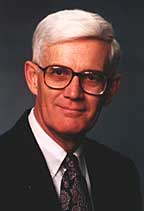 David Potts |
The first lecture will be presented by Martha Bayless, professor of medieval literature at the University of Oregon. She will talk on "The Symbolic and Real Uses of Manure in Medieval Europe." It will begin at 12 noon in Lovell Lecture Room of Baxter Hall.
The second lecture will be given by Dave Bischoff, a professional science fiction and fantasy writer. He will talk on "J.R.R. Tolkien and Fantasy Literature and will take place in Baxter Hall, Room 202 at 8 p.m. Given the wild success of the first two Lord of the Rings films, this lecture is sure to be a hit.
The third lecture, sponsored by the Center of Inquiry in the Liberal Arts and Phi Beta Kappa Society, will be presented by historian David Potts. He will speak on "Content Contests on a Level Liberal Arts Playing Field" at 8 p.m. in Lovell Lecture Room of Baxter Hall. A reception will follow the lecture in Rogge Lounge.
Bayless is an expert in medieval Latin literature, especially humorous verse, and is currently researching a book on the symbolism and reality of excrement in medieval society. She has written several books including Parody in the Middle Ages: The Latin Tradition; Entertainment; The Collectanea and Medieval Dialogues and Riddles; and Alcuin's Disputatio Pippini and the Early Medieval Riddle Tradition.
Bischoff is a widely published author of science fiction and fantasy. He's an expert in the history of fantasy literature and his talk promises to provide us with a real insider's view of Tolkien and his influence. He currently resides in Eugene, Oregon, where he lives with his wife Martha Bayless and their young son Bernie.
An emeritus professor of history at the University of Puget Sound, Potts will deliver the keynote address for the first in a series of colloquies co-sponsored by the Center of Inquiry in the Liberal Arts. Potts contributed the following abstract for his upcoming presentation. "Can we move beyond the culture wars in determining the content of a liberal arts curriculum? Can the inevitable contests for allocating limited time, space, and resources in undergraduate programs be decided according to accepted intellectual criteria? Might a key criterion reside in the relationship between content and process? This talk will explore the origins and import of a standard supplied by America's seminal statement on the ends and means of liberal arts education. Playing a pivotal role in the young nation's first major debate on collegiate curriculum, Yale's Reports of 1828 articulated an enduring definition of the liberal arts college."
All three talks are free and open to public.